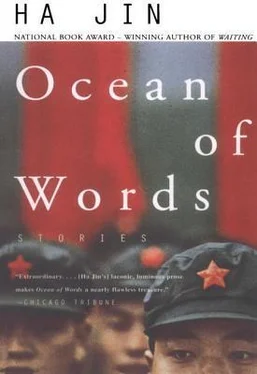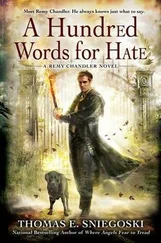I met Dragon Head on our first evening in Guanmen Village, which is twenty li north of Hutou. After the Battalion Headquarters settled in a small adobe house, whose owner of the landlord class had been exiled inland because of the tense situation at the border, the commander of the First Battery, Lin Hu, brought over a militiaman. They stepped in and whisked the snow off their clothes with their fur hats. The militiaman unbuttoned his blue overcoat, and a pair of large Mauser pistols, probably captured from the Japanese, were revealed at his flanks. He was tall and broad shouldered. The room grew darker as the flickering flame on the kerosene lamp cast his huge wavering shadow on the white wall.
“This is Militia Company Commander Long Yun,” Lin Hu said. Then he turned to the militiaman. “This is our battalion commander, Gao Ping.”
“How do you do?” I held out my hand.
“Happy to meet you,” Long Yun said and put his mittens on the table. We shook hands. His palms and fingers felt like an emery wheel. “You can call me Dragon Head, Commander Gao. All my soldiers call me that, because my surname is Long — dragon, you know. Ha-ha-ha!” He laughed heartily, ruffling up his hair with his hand. Two rows of tea-stained square teeth were displayed under his straight nose and moistened mustache. His bulging black eyes glittered with the unrestrained candor that marks the men on the Northern Frontier. I smiled, amused by this young man who took the militia as the regular army.
“Commander Gao,” Lin Hu said, “my battery has been lodged entirely, all together in seventeen homes. Our cannons and trucks are stationed at the threshing ground of the Third Production Team. If not for Dragon Head’s help, some of us would have to sleep outside tonight and turn into frozen meat tomorrow morning.”
“Don’t be so polite, Commander Lin,” Dragon Head said. “You fellas are the people’s army, our own army. You came to defend our country and protect our homes and land. How can we let you sleep in the snow? Our houses are your houses, and our beds your beds too.”
“Well said, Comrade Militiaman,” Commissar Diao Shu said loudly as he came in from the next room. He stretched out his hand to Dragon Head and continued, “Chairman Mao instructs us: ‘The army and his people have united as one man; see who can be our match under Heaven!” ’
I moved forward a little, intending to introduce them, but Diao made a gesture to stop me. “We met two hours ago,” he said to me, and then he turned to Dragon Head. “I’m glad to meet you again, Comrade Long. Ah, how could I forget ‘Dragon Head’! What a thunderous name! From now on, we are friends and comrades-in-arms, am I right?”
“Right. We certainly are.” Dragon Head looked pleased, his mouth spreading sideways with a broad smile. He inserted his hands behind the holsters of his pistols.
After they left, Commissar Diao and I went out to see how well the three batteries had been settled. He was to inspect the western half of the village; I would go through the eastern half. It was snowing lightly. A large flock of noisy crows flew by and merged into the indigo air. Stars, scrubbed by snowflakes, were dangling in the murky sky while kerosene lamps burst forth one after another at the windows of the dwarf houses. A whiff of fresh corn cake mingled with the smell of cow dung.
There were some two hundred and thirty homes in Guanmen Village, and our battalion, three hundred and four men, was quartered in ninety of them. We were a newly formed unit, whose three batteries came from three different armies in Liaoning Province. With brand-new weapons and equipment we arrived at the frontier to reinforce the anti-tank firepower of the Fifth Regiment. It looked like a war was about to break out. We were prepared to fight the Russians, and every one of the soldiers had written an oath in his own blood to show his determination to defend the Motherland. Before coming to Hutou, I had sent a letter home, telling Guihua, my wife, that she should marry another man if I could not return, but that she must take good care of our two children. The soldiers never complained about the hardship we had to undergo — no barracks, not enough nutritious food, the severe cold of Siberia. As the head of the battalion, it was my duty to make sure that every one of them had a warm place to sleep for the night. That evening I ended up having dinner with the Fifth Squad of the Third Battery at the eastern end of the village. We ate sorghum and stewed frozen radishes.
To express our gratitude to the villagers, we had a movie shown the following evening. People assembled at the marketplace in the center of the village, waiting excitedly to see The Guerrillas on the Railroad . A small electric generator was whining away, and two bulbs were shining on the poles holding the white screen. Pulling on long pipes, old men and old women sat on small stools, muffled up in fur overcoats. Young mothers held babies wrapped in cotton quilts, and the large gauze masks that shielded the women’s noses and mouths exuded warm breath. Children were running around and through the crowds; some of them perched on naked trees, waiting for the movie to start.
As soon as our three batteries sat down, Dragon Head’s men arrived. They were singing “Carry the Revolutionary Guns” and marching in good order directly to the front ground below the screen. All together about seventy of them passed by, and every one shouldered a weapon — Russian 1938 rifles, American carbines seized from Chiang Kaishek’s troops, three light machine guns of Japanese make, a small sixty-millimeter mortar also captured from the Japanese, a pair of antitank mines, and — most advanced of all — one Russian bazooka. A few soldiers rose to their knees to have a better view of the militia. Having noticed our attention, Dragon Head kept his men marching in place at the front for a good minute. Then he ordered loudly: “Si-t down!” In a unified hop they sat down on the ground. To my surprise, most of the militiamen, including Dragon Head, wore army uniforms, though without collar badges or hat insignia. It seemed they had really got it into their heads to emulate the regular army unit.
Hardly had they sat down than they started a song, “Down with the New Czar of Russian Revisionists.” In their tuneless chanting, there was a deep, booming voice directing all other voices, as though dragging them to an uncertain end. I could tell it was Dragon Head.
When they finished, Dragon Head jumped up and shouted: “People’s Army — ”
“Sing us a song!” His men followed in one voice.
“People’s Army — ”
“Sing us a song!”
The Second Battery began to sing a song composed for Chairman Mao’s quotation: “Who are our enemies? Who are our friends? This is a question of the first importance for the revolution. To ensure we will succeed in our revolution, we must unite with our real friends in order to attack our real enemies.”
When our men finished singing, without a request from the army side, the militia started another song, which was also a quotation from Chairman Mao: “A revolution is not a dinner party, or writing an essay, or painting a picture, or doing embroidery; it cannot be so refined, so leisurely and gentle, so temperate, kind, courteous, restrained, and magnanimous. A revolution is an insurrection, an act of violence by which one class overthrows another.” So they sang. But this time Dragon Head stood in front of his men, beating time with his big fists. The Mauser pistols were fluttering at his sides like a pair of hawks.
We had no time to sing another song back because the movie suddenly started. Soon, laughter and applause rose and fell in the hush of the night.
Both Commissar Diao and I were very busy. During the day he spent most of his time in the three batteries organizing the studies of Chairman Mao’s works and the documents issued by the Central Committee, while I was engaged in training the soldiers to operate the cannons more efficiently in the severe weather. We had to be well practiced. Guanmen Village was fifteen li from the Wusuli River, and the Russians’ tanks could cross the frozen river and arrive here within half an hour, so we had to be able to get ready in a very short time. My men were the best soldiers I had ever commanded; after three weeks’ drill, we could go into battle in twenty minutes.
Читать дальше











